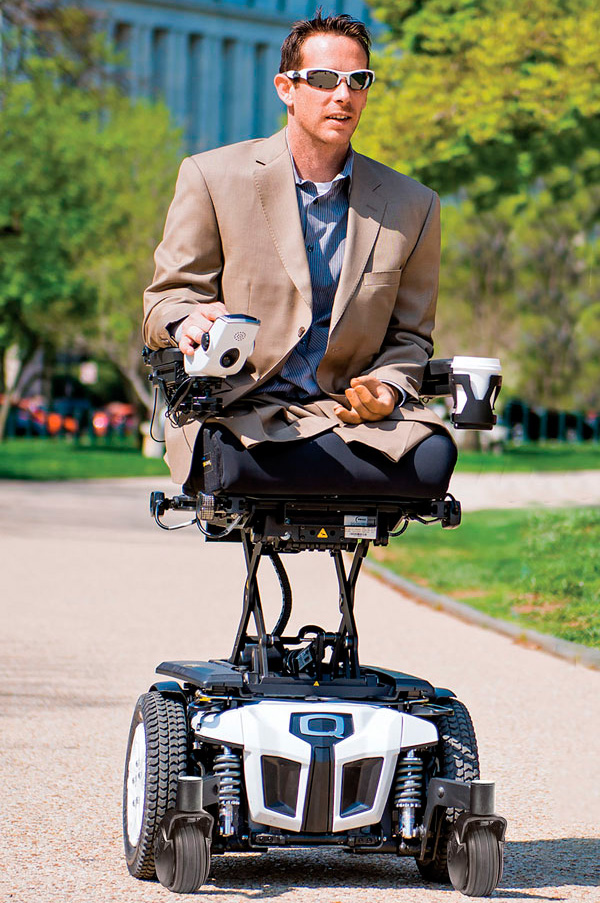We revisit our conversation with hometown hero and Iraq War veteran, Bryan Anderson, who talks about his remarkable journey from the battlefield to leading a different kind of army right here in Chicago, on Chicago Tonight at 7:00 pm.
Anderson enlisted in the Army in April 2001 and had a ‘ship out’ date of September 11, 2001. He served two tours of duty in Iraq and was stationed in the Baghdad area. He attained the rank of Sergeant in the Military Police (MP), conducted police training courses in Iraq and gained additional law enforcement experience at Leavenworth Federal Penitentiary as a prison guard.

In October 2005, Bryan was injured by an Improvised Explosive Device (IED) that resulted in the loss of both legs and his left hand. As a result of his injuries, he was awarded a Purple Heart. Bryan received rehabilitation for a period of 13 months at Walter Reed Army Hospital. He is one of the few triple amputees to have survived his injuries in Iraq.
Bryan has written a new book about his life called, No Turning Back: One Man’s Inspiring True Story of Courage, Determination, and Hope. Read an excerpt below.
1
Alive Day

On the day I got blown up, it was hot as hell. It was about eleven o’clock in the morning on October 23, 2005, in sunny downtown Baghdad, Iraq, and if I had to guess, I’d say it was a hundred and thirty degrees in the shade.
I was a specialist in the U.S. Army, 411th Military Police Company. Me and my guys were on our second tour in Iraq. We’d been designated as the “commander’s escort.” We were like a personal security detail for our commanding officer, who we’d nicknamed “Captain America” because whatever happened anywhere in Baghdad, he just wanted to be in the thick of it. Whenever anything happened, he was like “Let’s go! I want to do this! I want to get involved! I wanna conquer the world!”
Before you get the wrong idea, let me just say that I think his attitude was not a good thing. In my opinion, he was putting our lives in danger for no reason, just because he wanted people to think he was a “hands-on” kind of leader.
The reason we’d gotten stuck on that crap detail was that we’d worked with him once, and he’d said, “You know what? These are the people that I want to come out with me. They know their shit, they know what they’re doing.” Our punishment for being competent was getting to 𝚋𝚊𝚋𝚢sit him everywhere he went for the next year. Lucky us.

It’s not like he didn’t have plenty of other people to choose from. A company is roughly 150 soldiers, divided into four platoons, all doing a variety of missions. As MPs (military police officers), we had several tasks: We were training Iraqi police officers at the police academy. We were also going out to the police stations and teaching them basic upkeep; we taught them to maintain clean jail cells and how to stock enough food, ammunition, weapons, vehicles, and other supplies. We made sure they knew how to do a patrol and how to do a raid.
Other MPs handled transport security, such as MSR patrol, which is guarding a main supply route. In other words, if there was a main road that our troops traveled on a lot, we’d drive up and down it, making sure people weren’t laying IEDs (improvised explosive devices) and stuff like that. Some folks manned the gate and guarded the base. Everybody had a job to do.
For me and seven of my buddies, our job was driving Captain America through downtown hell.

Every day we would go and visit the Iraqi police stations. If any of our guys got hit by an IED, or if there was an attack, we would divert and respond to that, but the bulk of our work was a daily tour of the Iraqi police stations. We didn’t understand why we were going there; there were squad leaders and platoon sergeants who were designated to supervise those operations. If the CO had wanted to go out there once a week just to make sure nothing had burned down, that would’ve been okay, but every day? The noncoms manning those stations knew their jobs, and they were doing them just fine. I can’t tell you how many times I wanted to say to Captain America, “There’s simply no reason to go out there every day. You’re not the one that’s doing the job. And by going out there every day, you’re pissing off your sergeants by making them feel like you don’t trust them. Plus, you’re putting nine lives in danger that you don’t really need to.”
That’s how I felt, but I didn’t get a say in the matter, so that morning me and my guys saddled up for another tour of Baghdad’s police stations. Every morning, we would get up about an hour before we had to leave. That morning we got up around ten because we’d been on a mission late the night before. My team and I were wearing DCUs (desert camouflage uniforms) with long sleeves, and we had our Kevlar helmets and twenty-five-pound body-armor vests with shoulder pads and kidney pads. I was wearing my nine-millimeter pistol in my right thigh holster. I also had a sawed-off, twelve-gauge pump-action shotgun (for entry through locked doors; you’d blow the lock—BOOM!—and then kick the door open) and a SAW (squad automatic weapon) M249, a fully automatic, belt-fed machine gun. Because I was the driver, I got the M249, and since I was also an entry man, I got the shotgun, too. Being an MP, I carried my nine-mil—not everyone gets nine-mils. Not everybody gets a lot of things, but because of my multiple jobs I was all weaponed up.

As the driver, I had to make sure my truck was good to go. It’s called a PMCS, which stands for “preventive maintenance checks and services.” I checked the oil, the tires, and the air filter, and then I made sure there was gas in it. Of course, after every mission you always top off—always. You never know when you might get sent out again, so you’ve always gotta be ready. Next, I started putting my gear where I needed it to go. The gunner, Brad Gietzel, started mounting the gun on top of the truck. Me and my pal Kenny Olson were sitting up front, setting the radios, making sure that they worked and that we had communication with the TOCC (Tactical Operations Command Center).
At around eleven o’clock, we headed out.
Inside the truck, it was really hot. Most of the trucks had air-conditioning, but in half of them it didn’t work. When it did, it wasn’t strong, and it didn’t cool the truck down. My truck—and once you’re assigned a truck, it’s your truck—had working a/c, but to be honest, it didn’t do shit. At the end of the day, when I’d get off mission and take off my body armor, my DCUs would look like I’d just jumped in a pool. I mean, they’d be drenched. From the moment I stepped outside in Iraq, I was sweating my balls off. The only time I was comfortable was when I was back at base and in PTs—a T-shirt and shorts. That’s it. When I didn’t have body armor on and could just walk around the base in DCUs, it wasn’t so bad either. But being on a mission, all suited up in the heat, it sucked.
My Humvee’s interior was a cramped, green oven. It stank of diesel fumes from the engine. The housing for the drivetrain ran up the middle of the cab, and it got really hot. If my leg was up against it, it’d cook to medium rare in about a minute. And there was always dust from the street everywhere—up my nose, in my throat, coating my teeth with grit.
The other thing I noticed inside the truck was the hum. When the engine was running, I felt it—not just with my hands on the steering wheel but in the seat of my pants. Near the end of my first year and the start of my second year in Iraq, that hum and the feeling that went with it kind of made me feel comfortable—safe. I could fall asleep inside or on top of my truck, no problem. I came to think of my truck as a safe place—maybe the only safe place I had.
You see, I thought the protection on my Humvee was pretty good. It was an up-armored model already, with added steel plating and ballistic-resistant windows, and then my squad and I had put some soft armor—aluminum plates—on the truck ourselves. We put plates on the turret guard, the gunner’s shield, and the extra plates that go on the doors. So we thought we had a pretty good ride. Whenever I did my services-and-maintenances, I was sure I had a pretty kick-ass truck.
But it wasn’t just about the armor. My truck was like my home. When I was in the driver’s seat I had everything I needed. On my right, I always had a Pepsi and a bag of sunflower seeds. Kenny, who rode shotgun, always drank Dr Pepper. There was a lot of space between all of us inside the vehicle. The radio mount separated me and Kenny, and Gietzel was well behind us in the middle of the truck. Behind Gietzel, at the back of the truck, we had a cooler in the middle on the floor, and it was stocked with water and Gatorades.
My M249 and my shotgun were lying on the floor to the right of my seat.
Slung from the top in the back, tucked into the back corner of the overhead, we had our M136 AT4 cannon—an antitank weapon. We’d set it up so that all Gietzel needed to do was pull a string. That would undo a slipknot and drop the weapon right into his hands, so he could just pick it up and open fire, if he’d needed to.
Over my head, by the visor, I’d made a mesh web out of 550 cord, which looks like green rope but is actually a multipurpose nylon cord. If you cut 550 cord, inside it has a bunch of smaller white fibers braided together, and you can pull out individual strands if you need to do something small. I’d tied some of those white strands into a net so I could store stuff above my visor. I had a little notebook with nine-line medevac instructions. For a medevac, there are nine things you have to say when you’re calling in a helicopter to come pick up a wounded soldier—What’s the injury? How bad is it? Where are you? Is it coalition forces or Iraqi forces? and so on—so it’s nice to just have that book right there and be able to follow the steps and not have to think about it.
I also kept a pack of gum up in the net, and my gloves always went up there. So did my goggles, glasses, sunglasses, or whatever. I also stowed my iPod up there, in the corner, along with pair of sports earphones. Those always stayed in the truck. I’d made it so I could just pull one earphone down and put it on my left ear so I could hear everything that was going on to my right inside the truck—my buddies, the radio, and all that—and still, at the same time, rock out to my music. I also had speakers up there, for times when all of us felt like hearing some tunes, such as when we were hanging out in the motor pool or elsewhere on base. The best part? As the driver (and owner of the iPod), I got to pick the music. We’d listen to rock, punk, and even some soft stuff. One of our favorites was Linkin Park.

Technically, I wasn’t supposed to have the iPod in the truck, but whether it came out or not depended on who was in my truck. If it was just me and my guys, it was no big deal, but the iPod stayed out of sight when the commander or some other big shot rode with us.
Most of all though, when I was in my truck I felt I had more control over my destiny. In the barracks you had mortar rounds coming at you and you never knew where they were gonna hit. All you could do was run for cover. But in my truck I had my weapons, I was mobile, and I could take action. I could find out where the danger was coming from and take care of it.
But I didn’t have much control the day I got blown up.
The day was just getting started. We were only a mile or two from base.
My first year in Iraq, I’d just plowed through traffic. If any cars got in my way, I’d push them clear with my truck. I’d smashed a bunch of cars—it had been kind of fun.
During my second tour, the Army changed the protocol because of all the vehicle IEDs. We started calling them VBIDs (vehicle-borne improvised explosive devices). To deal with that new threat, we’d started leaving a cushion. We would get behind traffic and stay back 250 yards so that there was a nice bubble between us and the civilian vehicles. Then we wouldn’t let anyone get within 250 yards behind us either.
So we had five football fields’ worth of empty road, and we were driving.
To make this protocol work, you can’t drive very fast. You end up cruising at around five miles per hour. Bored, I was slouched in my seat, with my hands together at the bottom of the steering wheel. I sat with my left leg curled up under my right leg, which was down for driving—half Indian style. Kenny and I were passing the time bullshitting, and he said something funny about our CO. I laughed as I took my right hand off the steering wheel and reached down to grab my smokes. Now, I wasn’t supposed to smoke in my Humvee. It’s against regs, but I didn’t give a shit since Captain America was in the lead truck and I was in the rear truck. So I grabbed my smokes and pulled one out, and I was still lookin’ at Kenny because we were still talking.
As I lit my cigarette, the explosion went off.
For some reason, I didn’t hear it. I only saw it, out of the corner of my eye, to the left of me. The next thing I knew, everything was completely pitch-black. I couldn’t see anything. It wasn’t because I was knocked out. There was just so much smoke inside the truck that I couldn’t see shit. My first reaction was to look to my right, where everyone else was in relation to me inside the truck, and I called out, “Hey! Are you all right? We just got hit!”
I didn’t hear anything—nobody answered. And I thought, Shit! Are they dead? Twisting around, I strained to see through the smoke.
Understand that I had no idea I’d been hit; at that point I was worried only about my guys, not myself. I didn’t feel anything, no pain—not yet, anyway. So I struggled to pierce the curtain of smoke, but I saw nothing but green. I was totally confused. Why am I seeing green? I tried to sit back in my seat, but when I did, I rolled onto my back, and my head fell backward. Then I wondered, Why did my head fall backward?
When the explosion went off, it had cut off my legs and left hand instantly. My legs were on the floorboard, my hand was in the passenger seat—Kenny told me later that my hand had hit him in the face—and the blast had spun me sideways, so that I was lying on my back in my seat. When I’d looked to my right and saw green, I’d been looking at the back of my seat.





